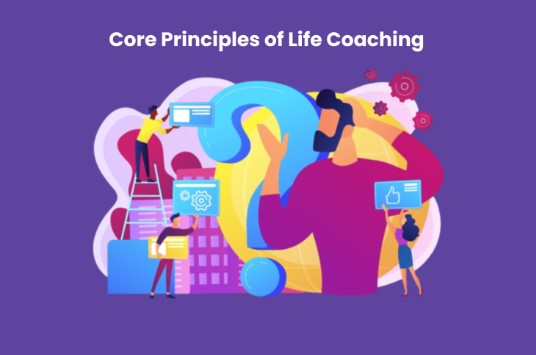When our health is put at risk for the sake of professional and personal advancement, it’s evident that we need guidance and support. Coaching, in its many forms, has become a beacon of hope for people who are grappling with the challenges of life and want to grow into their full potential. A set of core principles underpins this paradigm shift, empowering followers to push through obstacles, realise meaningful goals, and enjoy fuller, more fulfilling lives.
In this blog, we’ll look at the basics of life coaching to shed light on its wide-ranging benefits. Whether you’re preparing for a significant life change with a Health and Safety Online Course or simply curious about What is a Life Coach, this blog will show you why it might be a great asset to your growth and development.
Table of Contents
What Is a Life Coach? A Quick Explanation
Before delving into the basics of life coaching, it’s crucial to understand what a life coach really performs. A life coach is a proficiently trained professional who helps people in a variety of fields to reach their full potential. They help individuals identify their life goals, identify obstacles in realising those goals, and develop strategies for overcoming those obstacles. Unlike a therapist or consultant, a life coach actually works with their clients to achieve their objectives.
Principle 1: Establishing Trust and Rapport
The effectiveness of your coaching relationship with your life coach depends heavily on your ability to establish trust and rapport with them. There has to be trust between coach and client for there to be effective communication and forward progress. To help their clients feel safe opening up to them about their fears, goals, and aspirations, life coaches must first create a safe space in which their clients may do so. The foundations of trust are the ability to listen attentively, to empathise, and to be genuine. It is essential for customers to feel acknowledged and cared for in order to make any headway toward their goals.
Principle 2: Goal Setting and Clarity
Creating goals that are both attainable and significant is an essential part of life coaching. In order to achieve one’s ideal life, goal setting is an essential activity that provides one with focus and motivation. A life coach can help you develop SMART (specific, measurable, achievable, relevant, and time-bound) goals that are more likely to be achieved. When clients have this knowledge, they may take steps toward achieving their objectives with more confidence.
Principle 3: Active Listening and Powerful Questioning
Experienced life coaches know how to balance listening with probing questions. In active listening, you focus entirely on the client without making any mental notes or making any judgments about what they’re saying. Asking clients perceptive questions is one way to learn more about their worldviews, morals, and presuppositions. Clients are able to make more informed decisions and grow as individuals as a result of this approach.
Principle 4: Taking Responsibility and Making a Game Plan
A large part of a life coach’s role is to keep their clients accountable for their commitments. After identifying objectives and exploring available choices, clients build action plans outlining the steps they will take to realise those objectives. Life coaches keep their clients inspired and moving forward by providing regular feedback and guidance. Accountability is crucial for sustaining interest and ownership on the part of consumers in their growth.
Principle 5: Building Resilience and Confidence
Life coaching isn’t only about setting and achieving goals; it’s also about building confidence and perseverance along the way. To achieve this goal, life coaches provide their clients with the resources they need to tackle challenges head-on and become stronger as a result. When customers are given compliments and suggestions for how they might grow, they get the self-assurance they need to face challenges head-on.
Principle 6: Values and Belief Alignment
Finding out a person’s core values and beliefs is an important first step in life coaching. With the help of a life coach, an individual’s values and goals could be brought into closer alignment. When a person’s core beliefs, values, and actions are all in alignment, they experience more success and happiness.
Principle 7: Continuous Self-Reflection and Improvement
Life coaches consistently engage in introspection and the pursuit of personal growth. In order to give the best possible service to their clients, they make it a priority to expand their knowledge of coaching techniques constantly. Coaches can act as role models for the people they work with because of their commitment to personal development.
Principle 8: Tailoring the Approach
In life coaching, you won’t find a one-size-fits-all method. The most effective life coaches modify their strategies based on the needs of their customers. Taking into consideration the specifics of each case makes it possible to provide advice and support that is perfectly suited to the individual.
Health And Safety Online Course: A Tangible Example
There are various places where the principles of life coaching may be used outside the classroom. For instance, one can improve their marketability by enrolling in a “Health And Safety Online Course” to gain knowledge in this area. People can benefit from working with a life coach to set ambitious but realistic objectives, stay motivated as they learn the skills they need, and build up their confidence to the point where they know they can accomplish them.
Conclusion
Life coaching is founded on powerful and transformative principles that help its clients reach their full potential and achieve their goals. Life coaches build trust and rapport, set clear goals, practise active listening and powerful questioning, promote accountability, build resilience and confidence, align values and beliefs, self-reflect, and tailor the approach to each client to help them succeed. To help people achieve their objectives with life coaching, it is essential to first master these ideas. For more information, check this page out: The Knowledge Academy.
